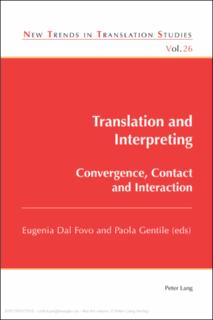Please use this identifier to cite or link to this item:
https://doi.org/10.21256/zhaw-13492Full metadata record
| DC Field | Value | Language |
|---|---|---|
| dc.contributor.author | Albl-Mikasa, Michaela | - |
| dc.contributor.author | Ehrensberger-Dow, Maureen | - |
| dc.date.accessioned | 2018-12-04T14:04:26Z | - |
| dc.date.available | 2018-12-04T14:04:26Z | - |
| dc.date.issued | 2019 | - |
| dc.identifier.isbn | 978-1-78707-752-2 | de_CH |
| dc.identifier.uri | https://digitalcollection.zhaw.ch/handle/11475/13492 | - |
| dc.description.abstract | The ubiquitous use of English by non-native speakers has become a hallmark of modern communication, even in a multilingual country with several national languages such as Switzerland. This phenomenon has prompted a great deal of research into English as a lingua franca (ELF), with most of it devoted to documenting its spread and investigating its communicative effectiveness. What appears at first glance to be a practical solution to facilitate exchanges in business, finance, education and science has a downside, however, because producing and processing a foreign language can add to cognitive load and stress. Since by definition ELF is not the same as standard English, additional effort must also be made on the part of native and non-native speakers alike to understand non-standard utterances. Professional interpreters and translators are especially affected by the increase in the use of ELF, because they have to cope with non-standard spoken or written input, respectively, while at the same time meeting high quality expectations for the target output. In this contribution, we explain where interpreting and translation studies converge with respect to the challenges associated with ELF and how process research techniques from the two disciplines can be merged in a mixed-method approach focused on determining the cognitive impact of processing non-standard language input. We suggest future directions in the under-researched area of interpreting, translation and ELF (i.e. ITELF) and outline what the implications of such research might be for model building, professional practice and training. | de_CH |
| dc.language.iso | en | de_CH |
| dc.publisher | Peter Lang | de_CH |
| dc.relation.ispartof | Convergence, contact, interactions in translation and interpreting studies | de_CH |
| dc.rights | Licence according to publishing contract | de_CH |
| dc.subject | Interpreting | de_CH |
| dc.subject | Translation | de_CH |
| dc.subject | English as a lingua franca | de_CH |
| dc.subject | Cognitive load | de_CH |
| dc.subject | Stress | de_CH |
| dc.subject.ddc | 418.02: Translationswissenschaft | de_CH |
| dc.title | ITELF – (E)merging interests in interpreting and translation studies | de_CH |
| dc.type | Buchbeitrag | de_CH |
| dcterms.type | Text | de_CH |
| zhaw.departement | Angewandte Linguistik | de_CH |
| zhaw.organisationalunit | Institut für Übersetzen und Dolmetschen (IUED) | de_CH |
| zhaw.publisher.place | Frankfurt am Main | de_CH |
| dc.identifier.doi | 10.21256/zhaw-13492 | - |
| zhaw.funding.eu | No | de_CH |
| zhaw.originated.zhaw | Yes | de_CH |
| zhaw.pages.end | 62 | de_CH |
| zhaw.pages.start | 45 | de_CH |
| zhaw.parentwork.editor | Dal Fovo, Eugenia | - |
| zhaw.parentwork.editor | Gentile, Paola | - |
| zhaw.publication.status | publishedVersion | de_CH |
| zhaw.publication.review | Editorial review | de_CH |
| zhaw.funding.snf | 173694 | de_CH |
| zhaw.webfeed | Dolmetschwissenschaft | de_CH |
| zhaw.webfeed | Übersetzungswissenschaft | de_CH |
| zhaw.funding.zhaw | Cognitive Load in Interpreting and Translation (CLINT) | de_CH |
| Appears in collections: | Publikationen Angewandte Linguistik | |
Files in This Item:
| File | Description | Size | Format | |
|---|---|---|---|---|
| 2019_Albl-Ehrensberger_Emerging-Interests-interpreting-translation_.pdf | 316.63 kB | Adobe PDF |  View/Open |
Show simple item record
Albl-Mikasa, M., & Ehrensberger-Dow, M. (2019). ITELF – (E)merging interests in interpreting and translation studies. In E. Dal Fovo & P. Gentile (Eds.), Convergence, contact, interactions in translation and interpreting studies (pp. 45–62). Peter Lang. https://doi.org/10.21256/zhaw-13492
Albl-Mikasa, M. and Ehrensberger-Dow, M. (2019) ‘ITELF – (E)merging interests in interpreting and translation studies’, in E. Dal Fovo and P. Gentile (eds) Convergence, contact, interactions in translation and interpreting studies. Frankfurt am Main: Peter Lang, pp. 45–62. Available at: https://doi.org/10.21256/zhaw-13492.
M. Albl-Mikasa and M. Ehrensberger-Dow, “ITELF – (E)merging interests in interpreting and translation studies,” in Convergence, contact, interactions in translation and interpreting studies, E. Dal Fovo and P. Gentile, Eds. Frankfurt am Main: Peter Lang, 2019, pp. 45–62. doi: 10.21256/zhaw-13492.
ALBL-MIKASA, Michaela und Maureen EHRENSBERGER-DOW, 2019. ITELF – (E)merging interests in interpreting and translation studies. In: Eugenia DAL FOVO und Paola GENTILE (Hrsg.), Convergence, contact, interactions in translation and interpreting studies. Frankfurt am Main: Peter Lang. S. 45–62. ISBN 978-1-78707-752-2
Albl-Mikasa, Michaela, and Maureen Ehrensberger-Dow. 2019. “ITELF – (E)merging Interests in Interpreting and Translation Studies.” In Convergence, Contact, Interactions in Translation and Interpreting Studies, edited by Eugenia Dal Fovo and Paola Gentile, 45–62. Frankfurt am Main: Peter Lang. https://doi.org/10.21256/zhaw-13492.
Albl-Mikasa, Michaela, and Maureen Ehrensberger-Dow. “ITELF – (E)merging Interests in Interpreting and Translation Studies.” Convergence, Contact, Interactions in Translation and Interpreting Studies, edited by Eugenia Dal Fovo and Paola Gentile, Peter Lang, 2019, pp. 45–62, https://doi.org/10.21256/zhaw-13492.
Items in DSpace are protected by copyright, with all rights reserved, unless otherwise indicated.